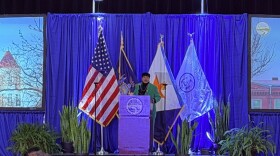Some Syracuse community centers are looking to expand conversations on Black history beyond the month of February.
For Robert Searing, the curator of history at the Onondaga Historical Association, Black history in Syracuse is more than important dates and stories. He said OHA is working to expand and democratize its collection to better reflect the communities it serves.
“People think of history and we think of dates and they think of the grand people, the big deals, but everybody has a history and everybody’s history is important, particularly when you are talking about a community,” Searing said. “So to get people to understand or to recognize that and to recognize that there is value in those histories and in those family photographs and in those oral histories, and again to open up the museum, to expand the base beyond your typical, average museum-goer, to make it more of a true community experience and a community institution is something that obviously OHA is trying to do.”
It’s places like the Dunbar Association that are helping to bridge the gap by developing racial equality and maintaining African American culture. The Dunbar Center’s Executive Director Andre Harper said expanding diversity, equity and inclusion is at the core of the Center's mission. According to Harper, Syracuse’s Dunbar Center has served many capacities in its over 100-year history, operating as everything from a settlement house to a Head Start program location and over the years the core mission stayed.
“The core is pretty much remaining the same in the fact that, heavily centered with the African American community, still committed,” Harper said. “As demographics in this community changed, Dunbar has kept the pace and is that organization that looks to serve the people who live on the Southside of Syracuse.”
Today, senior programming, after-school activities and community events are all part of a typical day at the Dunbar Center. Harper said everything done at the Dunbar Center is culturally communicated.
“That’s the important thing about the Dunbar Center because not only are we doing similar things that are being done like after-school programming is happening in a lot of different spaces, but when it’s happening at Dunbar Center, what we are trying to do is to make sure that it is culturally relative, culturally appropriate and culturally put to the youth so that they understand that this is a culture, this is not just you being in after-school but it is predicated on the fact that we need you to be and to do because it’s about the culture and it’s about us conveying that information, culturally relevant information as we impart wisdom to the youth,” Harper said.
Harper said expanding on Black history conversations to both preserve it and pass down legacy are vital to communities.
“We have to find a way to continue to ensure that the legacy of our forefathers is bigger than February and it’s communicated to the children throughout their upbringing,” Harper said.
Searing said turning to these conversations can help push communities forward.
“This city is highly segregated, it is in terrible rates of poverty, and a lot of those things are concentrated in areas where Black people in the city have historically been, essentially were, forced to live and where they remain because it is difficult to break out of the cycles of generational poverty,” Searing said. “So when we talk about the current problems and the challenges that we face, there are so many people looking to the mistakes that were made in the fifties and sixties to try to bring people to the table.”
He said that with more open information and resources the better chance there is to create more educated and equitable communities.
“The richer the tapestry, the more information that is there for research, the more that we as researchers and people living in the present, living in the world that is the product of decisions made in the past, can simply have a better grasp and hopefully we that we can make the world and the city and our communities more equitable and more empathetic, because of those experiences,” Searing said.
Harper said the Dunbar Center is a resource all Syracuse community members should look to and be proud of.
“This is a community center that is owned by the community,” Harper said. “There is no ownership by the city or the county, this belongs to the people of Syracuse and the African American people of Syracuse. But, I want all people to know that this is a center that everybody would be proud of because it has stood the test of time.”








